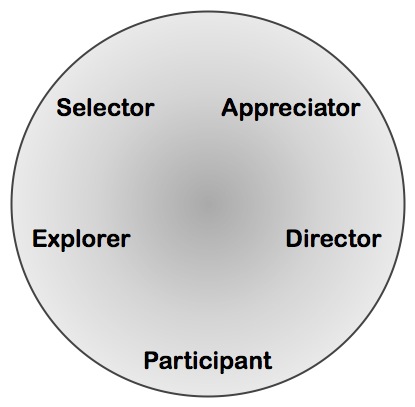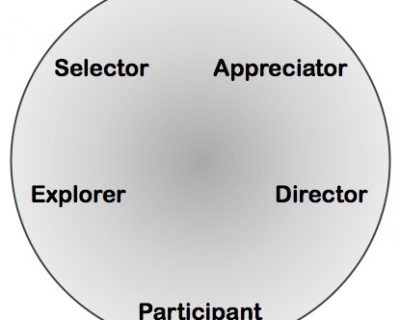My research shows that creative activity is most importantly directed by how interested and involved a person is during the creative experience. It has also revealed, on closer examination, particular ways in which this experience can manifest itself as modes of creative engagement.
There is good reason to think that creative activities using a computer are inherently engaging, given the amount of time people spend at these activities, however, it is also possible for computer software to be boring or frustrating. Therefore, as designers or users we need to pay attention to the modes of creative engagement that different systems foster. When you are engaged in a creative activity, the theory suggests, you approach the task in one or more of the following modes.
In a well-rounded creative life people can experiences different modes of creative engagement as they pursue their creative activities.

An appreciator – pays carefully attention to creative works and analyses associated ideas and theories.
A director – manages creative activities
An explorer – searches through possibilities and assesses their creative potential
A participant – is involved in intuitive creative expression
A selector – makes curatorial judgements about appropriateness or value of creative works or practices.
An outline of the modes of creative engagement applied to computer music composition was published in a 2000 academic paper. Then outlined in more detail in my PhD thesis in 2003. It developed during the 2000s into the theory of Meaningful Engagement when combined with Steve Dillon’s ideas on meaningful music making, most fully outlined in our 2021 chapter, Meaningful Engagement with Music Composition.
References
Brown, Andrew R. 2000. “Modes of Compositional Engagement.” Miropolyphony. http://pandora.nla.gov.au/tep/10054.
Brown, Andrew R. 2003. “Music Composition and the Computer: An Examination of the Work Practices of Five Experienced Composers.” PhD thesis, Brisbane: The University of Queensland.
Brown, Andrew R., and Steve Dillon. 2012. “Meaningful Engagement with Music Composition.” In The Act of Musical Composition: Studies in the Creative Process, edited by David Collins, 79–110. Surrey, UK: Ashgate.

